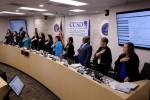EDITORIAL: Despite facility needs, teachers get $27.4 million in raises
Labor peace won’t come cheap for the Clark County School District. On Thursday, the School Board will vote on a one-year contract for teachers that provides a variety of pay raises at a net cost to the public of $27.4 million for the 2013-14 school year.
If trustees ratify the contract, which already has been approved by members of the Clark County Education Association, it will mark the first time in three years that teacher pay has not been decided by an arbitrator. And it’s easy to see why teachers are eager to seal the deal.
The contract provides teachers with “step” and “column” pay raises, typically around 3 percent, that are based on seniority, certification and graduate school credits; nearly doubles longevity premiums for longtime teachers; and shifts to the public the cost of a pension contribution increase equivalent to 1 percent of pay. Considering the school district’s ongoing financial struggles and frequent claims of need, where did this money come from? Kirsten Searer, chief of staff and external relations for Superintendent Pat Skorkowsky, said the raises are covered by a $200 increase in state per-student funding, as well as growth in tax collections.
“I believe this is a fair contract for employees, taxpayers and, most importantly, for students,” Mr. Skorkowsky said. “For the first time in several years, our teachers started the school year with a contract in place, ensuring they can focus all their efforts on instruction for every student in every classroom.”
Few people deserve a pay raise as much as a great teacher. But these raises aren’t based on classroom performance. They’ll be awarded across the board, to the excellent, adequate and inadequate alike. The district’s revised teacher evaluation system and merit pay protocols can’t take effect soon enough. This is an inefficient use of precious resources, given the school district’s other urgent needs.
Southwest valley elementary schools are bursting at the seams, and roofing and air-conditioning units are in poor condition across town. At least some of this new money should have been dedicated to the most urgently needed maintenance and repair projects. For less than $27.4 million, the district could have built a new elementary school to relieve crowding. This week, the district reported record unofficial enrollment of 315,087, up from 311,429 last year.
To the school district’s credit, it is trying to save teachers and the public money by moving teachers out of their union-run health trust, which is on the verge of implosion, and into a health insurance plan that would cover all district employees. That issue is still being negotiated with the CCEA. The bad news: the district appears intent on turning whatever savings are generated by such a reform into yet more teacher pay raises.
Teachers, school district administrators and School Board trustees have to understand that precious few private-sector workers are getting pay raises or retirement contributions, yet those same workers are asked again and again to support higher taxes for schools claiming to be cash-poor. This contract doesn’t help the district’s case.























